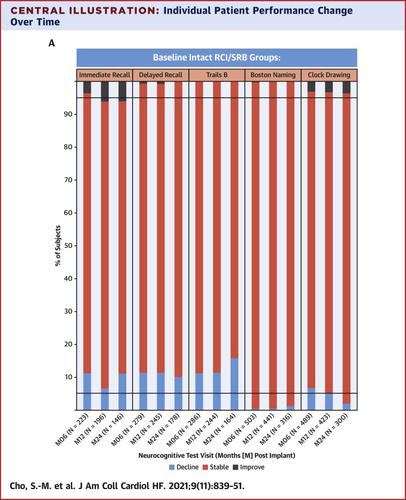JACC: Heart Failure ( IF 13.0 ) Pub Date : 2021-09-08 , DOI: 10.1016/j.jchf.2021.05.016 Sung-Min Cho 1 , Darlene Floden 2 , Kristie Wallace 3 , Nicholas Hiivala 3 , Susan Joseph 4 , Jeffrey Teuteberg 5 , Joseph G Rogers 6 , Francis D Pagani 7 , Nahush Mokadam 8 , David Tirschwell 9 , Song Li 9 , Randall C Starling 10 , Claudius Mahr 9 , Ken Uchino 2

|
Objectives
The authors sought to examine the long-term cognitive outcome of patients with continuous flow left ventricular assist device (CF-LVAD).
Background
Data on long-term neurocognitive outcome in LVAD are limited. We examined the neurocognitive outcome of patients who received a CF-LVAD as destination therapy.
Methods
Patients with HeartWare (HVAD) and HeartMate II who were enrolled in the ENDURANCE and ENDURANCE Supplemental trials were eligible. Cognition was evaluated with neuropsychological testing preoperatively and at 6, 12, and 24 months after implantation. General linear models identified demographic, disease, and treatment factors that predicted decline on each neurocognitive measure.
Results
Of 668 patients who completed baseline testing and at least 1 follow-up evaluation, 552 were impaired at baseline on at least 1 cognitive measure. At each follow-up, approximately 23% of tested patients declined and 20% improved relative to baseline on at least 1 cognitive measure. Of those who were intact at baseline, only 10%-12% declined in delayed memory and 11%-16% declined in executive function at all 3 follow-ups. For patients impaired at baseline, delayed memory decline was associated with the HVAD device and male sex, whereas executive function decline was associated with the HVAD device and stroke during CF-LVAD support. For patients intact at baseline, male sex and history of hypertension were associated with decline in immediate memory and executive function, respectively.
Conclusions
Neurocognitive function remained stable or improved for most patients (∼80%) with CF-LVAD at 6, 12, and 24 months after implantation. Male sex, hypertension, HVAD, and stroke were associated with cognitive decline.
中文翻译:

连续流左心室辅助装置患者的长期神经认知结果
目标
作者试图检查持续流左心室辅助装置 (CF-LVAD) 患者的长期认知结果。
背景
LVAD 长期神经认知结果的数据有限。我们检查了接受 CF-LVAD 作为目的地治疗的患者的神经认知结果。
方法
参加 ENDURANCE 和 ENDURANCE 补充试验的 HeartWare (HVAD) 和 HeartMate II 患者符合条件。在术前和植入后 6、12 和 24 个月通过神经心理学测试评估认知能力。一般线性模型确定了预测每个神经认知测量下降的人口统计学、疾病和治疗因素。
结果
在完成基线测试和至少 1 次随访评估的 668 名患者中,552 名在基线时至少在 1 项认知测量方面受损。在每次随访中,大约 23% 的受试患者在至少一项认知测量方面相对于基线下降了 20%。在基线时完好无损的人中,在所有 3 次随访中,只有 10%-12% 的延迟记忆下降,11%-16% 的执行功能下降。对于基线时受损的患者,延迟记忆衰退与 HVAD 设备和男性相关,而执行功能下降与 HVAD 设备和 CF-LVAD 支持期间的中风相关。对于基线时完好无损的患者,男性和高血压病史分别与即时记忆和执行功能下降有关。
结论
大多数 CF-LVAD 患者(约 80%)在植入后 6、12 和 24 个月的神经认知功能保持稳定或改善。男性、高血压、HVAD 和中风与认知能力下降有关。



























 京公网安备 11010802027423号
京公网安备 11010802027423号